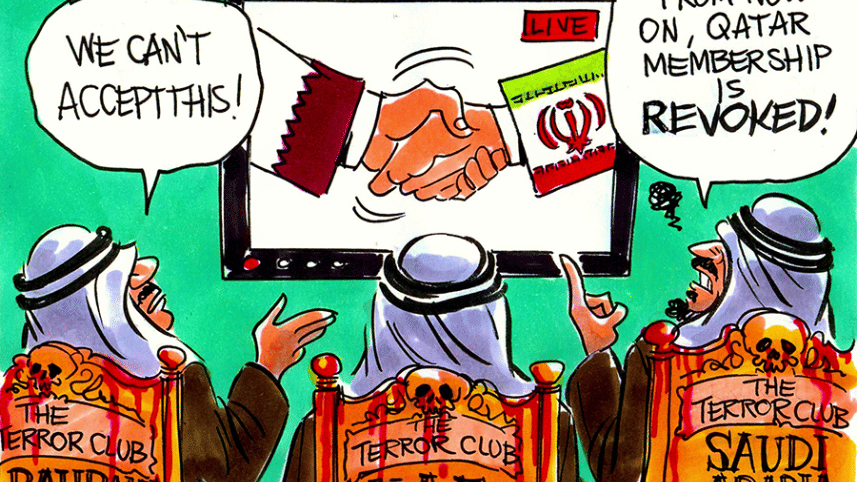Qatar: Backing the wrong terrorists

On September 19, Qatari Emir Sheikh Tamim bin Hamad Al Thani condemned the ongoing diplomatic crisis and blockade by their neighbours (and the Maldives, for some reason unbeknownst to all possible rationality) in a speech almost as long as his name. This was met with what all speeches at the UN General Assembly are met with—about half the room politely applauding to hide the fact that they were not listening to the translator in their ear, and the other half not bothering to put in that much effort, as it would mean actually having to do anything other than getting paid to sit in New York in a vegetative state. Half an hour later, President Donald Trump voiced some naïve drivel about how confident he was that the problem would be resolved soon, mirroring a plethora of US Presidents who have said this about the Middle East for the last few decades [and as we know, they were all always right]. This was eventually forgotten roughly 19 seconds later when President Trump cheerfully announced the imminent utter annihilation of North Korea while humming an Elton John track.
Qatar being sent to a corner without dinner came all too suddenly in June. Its neighbouring Gulf States placed an embargo to discipline it, as until then Qatar had probably been the least fundamentally damaged state in the region, which mind you, when speaking of the Middle East, isn't saying much. It's a relatively small country whose only real blemishes are the extensive use of slave labour and possibly only covert funding of international terrorist groups, as opposed to Saudi Arabia who have been doing it for so long they don't even hide it from the national budget anymore.
Therein, however, lies the probable cause. Saudi Arabia, the bloated kingpin of the Middle East, supports different extremists and fundamentalists from the ones Qatar does. It's also why they don't like Iran, for example. Qatar supported the Muslim Brotherhood during the Arab Spring and has long supported Hamas. Saudi Arabia has normally just preferred rabid suicide bombers and has long given up on the Palestinian cause. At this point, it must be reiterated that neither side can be classified as “not insane and evil” but in diplomatic crises we speak in relatives, not absolutes. So, when the Gulf countries cite Qatar as supporting terrorists, it's just not the terrorists the others are funding and arming and teaching to blow themselves up in the name of God.
Another major point of irritation for the more rabid and “backwards” Middle Eastern countries (still looking at you, Saudi Arabia) has been the Al Jazeera news network based in Doha. Al Jazeera has long been seen as a real progressive success of the Middle East—an internationally renowned media station offering outspoken and quality reporting beyond the state-sponsored propaganda machines and neutered-by-censorship drivel we usually see day to day. This obviously does not sit well with a country that has barely changed in the last 500 years, where women can get stoned to death if there's nothing to watch on Sundays since Game of Thrones ended. Imagine the uproar in the House of Saud when they see women reporting for Al Jazeera, that too without headscarves. It's an offense to the most basic fabrics of Saudi society. And also, whatever terrible tragedy is being reported on is probably their fault.
Lastly, Qatar has been seen as getting too friendly with Iran, the leper of the region. Obviously, there are insurmountable differences that prohibit Sunnis and Shias to be friends, or even passing acquaintances, like you and that guy whose name you don't remember (and probably never knew) but say hi to if he sees you on the street before you can avoid eye contact. In fact, these differences are so grievous across various countries at this exact moment that their people are slaughtering each other mercilessly.
Qatar has been handed a list of demands by the other Gulf countries, including the shutting down of Al Jazeera, an immediate end to the supporting of their terrorists, and an annual tournament where children hunt each other with bows and arrows and swords and spears and stuff in a sacrificial spectacle for the enjoyment of the Mad King Salman in Riyadh. He will probably watch through that mysterious orb that he made Trump touch a few months ago. Qatar has responded by flexing its financial muscle by buying Neymar of Brazil and sending him to Paris, because no amount of money could convince him to show up at Qatar. The blockade has eased since June, many on-looking countries who were looking in like your neighbour when you're changing and had sided with the Saudis have gone back to restarting diplomatic relations. Iran has offered support but that has not helped since Qatar's airspace becoming very limited. The Kuwaiti Emir, objectively the most useless of all Emirs, is mediating this conflict. When it will end, who knows. But don't feel too sorry about a bunch of Arabs having a money fight because no matter what happens they will have so much more money and oil than you and even laughing at their misfortune is depressing.
Next week: 5 things everyone else became ok with 800 years ago that women in Saudi Arabia can still be stoned to death for—number 4 will shock you.
Bareesh Hasan Chowdhury is a recent Political Science graduate.
 For all latest news, follow The Daily Star's Google News channel.
For all latest news, follow The Daily Star's Google News channel.
Comments